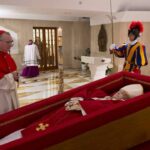Pope Francis warns press not to rely on rumors,gossip
Published on September 24, 2016 at 10:23 AM by FACE OF MALAWI
The Vatican’s Pope Francis on Thursday spoke out against mass media, which he says has the power to shape the public’s response to any challenge.
In Europe there is a continent struggling to deal with a refugee crisis which some countries ill-treat foreigners, so Pope has strived to a voice of peace and unity.
During an address to Italy’s national journalism guild, Pope Francis told leaders of the industry that the press has the power to act like “terrorists” when it relies on gossip and rumors, particularly while covering humanitarian crises such as Europe’s influx of migrants.
Yet while studies show that the press can help shape public dialogue, some experts say that the public opinion also plays a major role in shaping the tone that is reflected in the press.
“The bottom line is that there is a complex interaction between media, public opinion, and policymaking. To some extent, they’re indistinguishable from one another,” says Oxford University media analyst Robert McNeil. “They all drive one another.”
Over 1 million people made their way into Europe in 2015 alone, with even more flooding European borders over the course of the past several years. They came seeking many things: some sought freedom from fear, others a respite from civil war or corrupt government, and some made the journey in search of better economic opportunities.
Although many European countries were at first open to the idea of sheltering migrants, the reality of coping with so many asylum seekers has been daunting for beleaguered governments; a factor that some experts say has led citizens of countries such as Germany to become less welcoming
Subscribe to our Youtube Channel:


